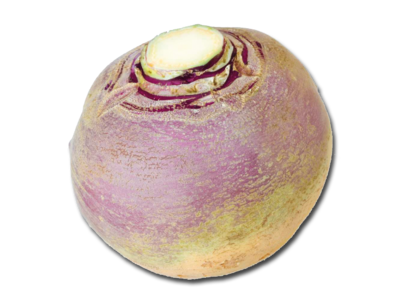|
This vegetable is
very low in calories and swedes are healthy vegetables that provide goodness.
This root vegetable will provide a higher nutritional value if it isn't over-cooked.
The amount of calories in swede depends on the cooking method, for example if
it is roasted, baked, steamed mashed, pureed or boiled. The following calorie
guide can be used to calculate the amount of calories in swede.
Calories in Swede
per 100 grams:
Boiled
Swede - 11 calories
This vegetable
provides many health benefits as it's a good source of vitamins and nutrients.
This healthy vegetable provides vitamin A and vitamin C. The nutritional value
of swede is great as this smooth tasting, mild and sweet flavoured vegetable
provides a rich source of fibre, calcium and potassium.
Antioxidant
Activity: Perhaps the most important function of Swede
involves its diverse composition of antioxidant compounds. Glucosinolates,
which are somewhat rare, sulphur-containing compounds that have been shown to
reduce the growth of cancerous tumours in the body. Furthermore, the high
levels of carotenoids and vitamin C act as antioxidants, which combat the
effects of free radicals, thereby preventing the mutation of healthy cells into
cancerous cells, among other effects. Swede can effectively prevent premature
aging, improve eyesight, and stimulate the healthy regeneration of cells
throughout our organs and tissues.
Digestive Health: Like all cruciferous vegetables, Swede are very high in fibre,
providing more than 12% of your daily requirement in each serving. Dietary fibre
functions in a variety of ways in the body, but primarily it improves digestion
by bulking up stool and preventing constipation and gastrointestinal distress.
Staying regular is an essential part of your overall health and also helps in
weight loss efforts. As a low-calorie, nutrient-rich food source, Swede are
praised as components of a weight-loss diet, and the high level of fibre also
helps to make you feel full, thereby reducing the chances of overeating.
Immune System
Health: As mentioned, vitamin C is the major vitamin present in Swede,
and a single serving contains more than half of the required daily allotment of
vitamin C in our diet. Vitamin C is essential for many bodily processes,
including the stimulation of the immune system to produce white blood cells.
Beyond that, vitamin C is a necessary element in the production of collagen,
which contributes to the development and healing of skin tissue and muscles, as
well as blood vessels. High levels of vitamin C can also help directly prevent
colorectal cancer, as a number of research studies have attested.
Blood Pressure and
Cardiovascular Health: Potassium is a very valuable part
of rutabaga’s nutritional offerings, as potassium can help to lower blood
pressure by reducing the stress and contraction of blood vessels. This allows
for easier passage of blood, increased oxygenation to vital organs and systems,
and a lower chance of clotting. Combine potassium with the fibre content in Swede,
which helps to reduce cholesterol levels, and you have a sure-fire way to
prevent atherosclerosis, effectively lowering your risk of heart attacks and
strokes.
Strong Bones: Swede are a wealth of important minerals, including zinc,
calcium, magnesium, manganese, and phosphorous, all of which play key roles in
the creation and maintenance of bone tissue. Osteoporosis affects millions of
people around the world, and keeping your bones healthy and strong as you get
older will help to avoid this common age-related disorder.
Metabolic Function: Swede represent a great option for many vegetarians, as it
nearly provides a complete protein, something that most vegetarians struggle to
acquire when they don’t consume meat. Proteins and amino acids are the building
blocks of new cells and are necessary to promote proper development, growth,
healing, reproduction, muscle contraction, and dozens of other important bodily
processes.
Enzymatic Function: Zinc is a key component of many enzymatic functions throughout
the body, without which our bodily processes become inefficient, resulting in
more dangerous health concerns. The moderate levels of zinc found in Swede are
highly praised for this reason.
Diabetes and Weight
Loss: Although Swede fill the role of potatoes in many cultures, they
don’t have as many carbohydrates, which break down into simple sugars,
potentially wreaking havoc on glucose and insulin levels in the body.
Therefore, Swede are often turned to as an alternative to potatoes for diabetic
patients and those who want to cut back on the carbs. The vegetable can
essentially help prevent the onset of Type 2 diabetes. While there are only
about 20% less carbohydrates in equal portions of Swede than in potatoes, the
additional nutritional value makes Swede a much wiser and more delicious
choice!
A Final Word of Caution: There are currently no known health risks for rutabaga, aside
from the risk of having an allergy, which is quite rare. However, if you are
allergic to turnips, cabbage, spinach, or other cruciferous vegetables, consult
a doctor to see if it is safe to add rutabaga to your diet.
|

